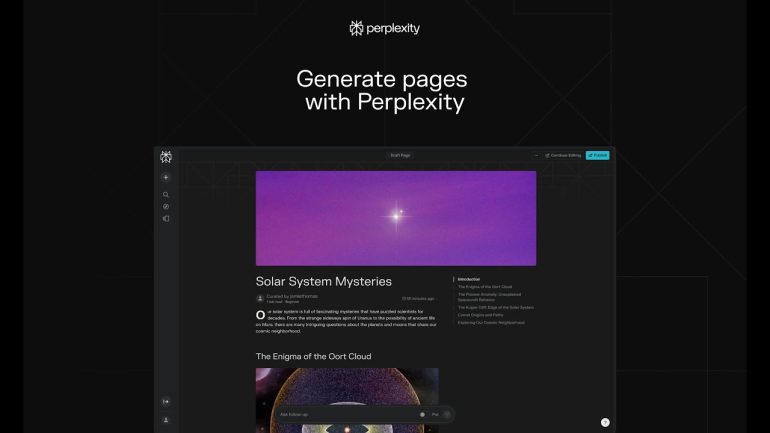- Perplexity AI introduces Pages, an innovative tool for collaborative content creation leveraging LLMs.
- Users can seamlessly generate, edit, and format content with AI assistance, enhancing efficiency.
- Pages democratizes content creation but warrants caution due to AI’s potential inaccuracies.
- The platform signifies a shift from LLMs as information providers to active content creators.
- Despite its promise, Perplexity must mitigate misuse risks to maintain content integrity.
Main AI News:
Perplexity AI’s latest unveiling, Pages, introduces a groundbreaking avenue for fortifying the dominance of Large Language Models (LLMs). While the utilization of LLMs for content generation isn’t a novelty, Perplexity Pages distinguishes itself by offering a comprehensive platform facilitating seamless collaboration between users and AI throughout the content creation process.
From conceptualization to publication, Perplexity Pages streamlines content creation with its user-friendly interface and intuitive features. Users can effortlessly craft content, conduct research, draft, edit, and format pages, all while leveraging the prowess of LLMs. The platform empowers users to manipulate sections, generate visuals, and effectuate changes through simple prompts, ensuring a fluid and efficient workflow.
Accessible to all users, Pages represents a significant stride towards democratizing content creation. However, users are advised to exercise caution due to potential inaccuracies stemming from the AI’s propensity for hallucinations and reliance on unreliable sources. Furthermore, the platform’s current limitations, such as the difficulty in manual content editing post-generation, pose challenges for topics necessitating extensive refinement.
Nonetheless, Pages underscores a potential paradigm shift in content creation, marking a transition from LLMs serving as mere information conduits to active content creators. By accumulating a robust dataset and fostering user engagement, Perplexity can augment its offerings, potentially steering towards monetization avenues in the future.
As the commodification of LLMs accelerates, the significance of data quality emerges as a pivotal differentiator. While the efficacy and longevity of Pages remain uncertain, its user-friendly interface and convenience render it a promising tool for content creation. However, Perplexity must devise mechanisms to prevent misuse, lest the inundation of poorly curated content compromises its integrity.
In a landscape where companies vie to establish proprietary advantages, Perplexity’s Pages emerges as a potent contender, embodying the convergence of AI-driven content creation and user engagement. With the competitive landscape evolving rapidly, the trajectory of Perplexity and its peers remains uncertain, underscoring the dynamism inherent in the AI ecosystem.
Conclusion:
The unveiling of Perplexity Pages marks a significant advancement in content creation, highlighting the transformative potential of LLM integration. While poised to streamline workflows and foster user engagement, the platform’s success hinges on mitigating inherent risks associated with AI-driven content generation. As the market continues to evolve, the ability to harness AI capabilities effectively will be paramount for companies seeking to establish competitive advantages in the burgeoning landscape of content creation tools.

